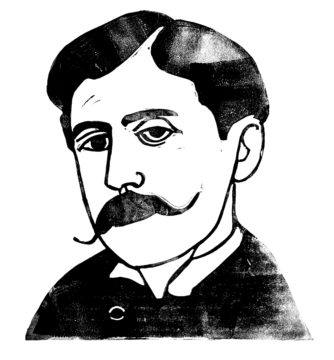Adam Gopnik in The New Yorker:
 When the first volume of “In Search of Lost Time” appeared, a year before the Great War, the shock of its excellence was captured in a delicious exchange with André Gide, the magus of the Parisian literary scene. Apologizing for having passed on “Swann’s Way” for his Nouvelle Revue Française, Gide offered an explanation almost more insulting than the original rejection: “For me you were still the man who frequented the houses of Mmes X. and Z., the man who wrote for the Figaro. I thought of you, shall I confess it, as ‘du côté de chez Verdurin’; a snob, a man of the world, and a dilettante—the worst possible thing for our review.” Proust, who had money, had offered to help subsidize the publication, which, Gide fumbles to explain, only made it seem a dubious effort at buying a reputation. (That year, Gide confided in his journal his doubts that any Jewish writer could truly master the “virtues” of the French tradition.)
When the first volume of “In Search of Lost Time” appeared, a year before the Great War, the shock of its excellence was captured in a delicious exchange with André Gide, the magus of the Parisian literary scene. Apologizing for having passed on “Swann’s Way” for his Nouvelle Revue Française, Gide offered an explanation almost more insulting than the original rejection: “For me you were still the man who frequented the houses of Mmes X. and Z., the man who wrote for the Figaro. I thought of you, shall I confess it, as ‘du côté de chez Verdurin’; a snob, a man of the world, and a dilettante—the worst possible thing for our review.” Proust, who had money, had offered to help subsidize the publication, which, Gide fumbles to explain, only made it seem a dubious effort at buying a reputation. (That year, Gide confided in his journal his doubts that any Jewish writer could truly master the “virtues” of the French tradition.)
Proust responded with the most beautiful fuck-you letter in literary history, suavely pretending that Gide’s belatedly flattering letter made up for all the previous insults: “Had there been no rejection, no repeated rejections by the N.R.F., I should never have had your letter. . . . The joy of receiving your letter infinitely surpasses any I should have had at being published by the N.R.F. . . . How I should like to be able to give someone I loved as much pleasure as you have given me.” Gide, no fool, made a firm offer to publish the rest of the novel, which the Nouvelle Revue did, right through to its completion.
The exchange underlines several aspects of Proust as a phenomenon. First, Proust landed on his contemporaries with something of the same revelatory shock that he delivers to us. Perhaps only the abrupt celebrity of Karl Ove Knausgaard has had the same effect in our time. What made the metamorphosis? The unimaginably large space between the Proust of “The Mysterious Correspondent” and the Proust of “Swann’s Way” lies in his learning to trust the meandering nature of his own intelligence. He found a voice by hearing his own. The one thing that Proust’s mature literary manner is not is mannered. It was as natural and unimpeded as Mark Twain’s. His mind moved exactly as his sentences do, and his gift was to be able to trace its movements without being halted by other people’s literary rules.
More here.
